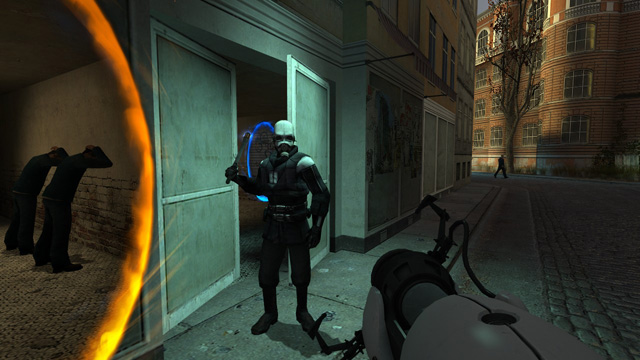 Valve recently announced that with the purchase of the PS3 version of upcoming blockbuster Portal 2, players would be given a free Windows and Mac OS version of the game. It signals a trend in exclusivity deals that has taken the gaming world by storm lately, but it also provides a glimpse at something far better.
Valve recently announced that with the purchase of the PS3 version of upcoming blockbuster Portal 2, players would be given a free Windows and Mac OS version of the game. It signals a trend in exclusivity deals that has taken the gaming world by storm lately, but it also provides a glimpse at something far better.
The exclusivity conundrum began many years ago, as console makers struck deals with game companies to produce hit titles only for their particular game systems. It spawned an intense culture of fanboyism, as distraught gamers were urged to take sides in the corporate battle; if you like Mario, you need a Nintendo, but if you like Sonic the Hedgehog, you’ll have to buy a Sega Genesis. That same strategy has persevered into the current generation of games as well; Gears of War fans need an Xbox 360, but God of War fans need a PlayStation 3.
Though companies owned by Nintendo, Microsoft, and Sony still make exclusive games, the rising costs of game production have made it necessary for many independent companies to make their games available on as many platforms as possible. To adapt, Sony and Microsoft began a strategy most popularized by Grand Theft Auto. With GTAIII, Sony created an advantage for PlayStation 2 owners by paying Rockstar Games for a timed-exclusive, meaning the game would only be available on PS2 for a specified amount of time. By the time GTAIV was announced seven years later, Microsoft countered with a new strategy that had gamers fuming. The game would be released on both the PS3 and the 360 at the same time, but the 360 version would receive exclusive downloadable content, including additional storylines and gameplay modes. Microsoft was essentially paying for PS3 owners to receive an inferior product for the same price. Later it was revealed that this content was also just a timed-exclusive, but it was certainly not the only example of gamers being hurt by the battle for supremacy between Sony and Microsoft. Timed Exclusives would be later met with the late-version having a new polish and more features; gamers were left wondering who got the better deal.
While the Portal 2 deal is sure to leave 360 owners furious, PS3 owners will no longer have to decide between purchasing the game for PS3, Windows, or Mac OS, because they will receive all three copies at no extra cost, thanks to Valve’s digital distribution program Steam. PS3 users will simply link their free Steam account to their PS3, and they can then freely download the game to their computers. The deal also includes cross-platform online play.
Gamers should hope this will signal a new era in gaming, where they can play the games they buy on whatever platforms they own, no longer dictated by the fight for financial supremacy. Though Microsoft chose not to allow the Steam integration that makes this innovative strategy possible, if gamers demand more freedom to play the games they want, console makers may be forced to accept those terms.
It is a fantastic proposition to offer for the price of one game: the ability to play your favourite game in the living room on your PS3, as well as on your home computer, and also outdoors on your laptop. When you also consider the unifying possibilities of playing online with others who own the same game, regardless of the system they are playing it on, that is a future worth pushing for. That is a future for gamers.


